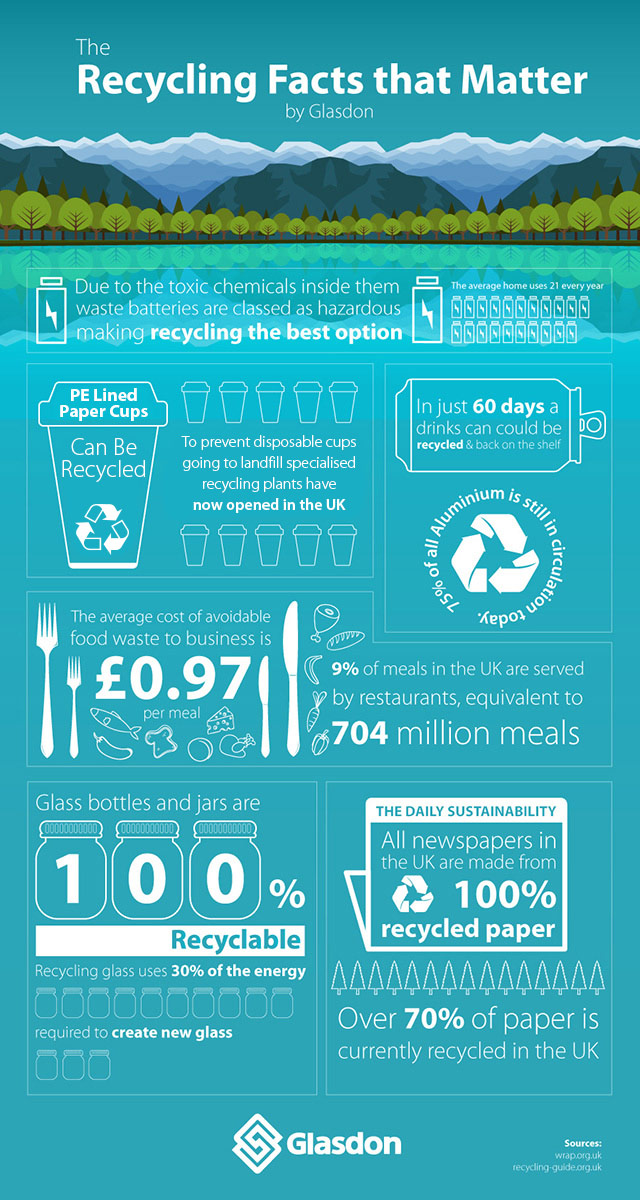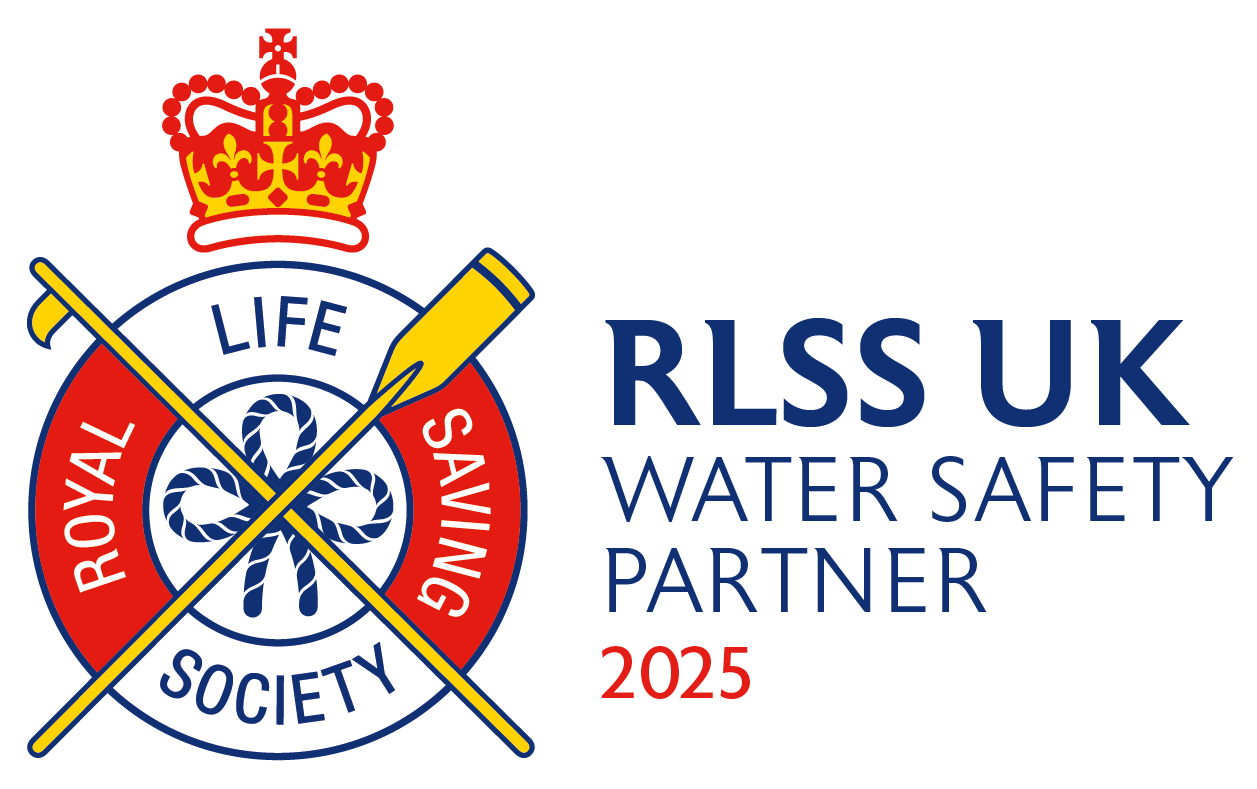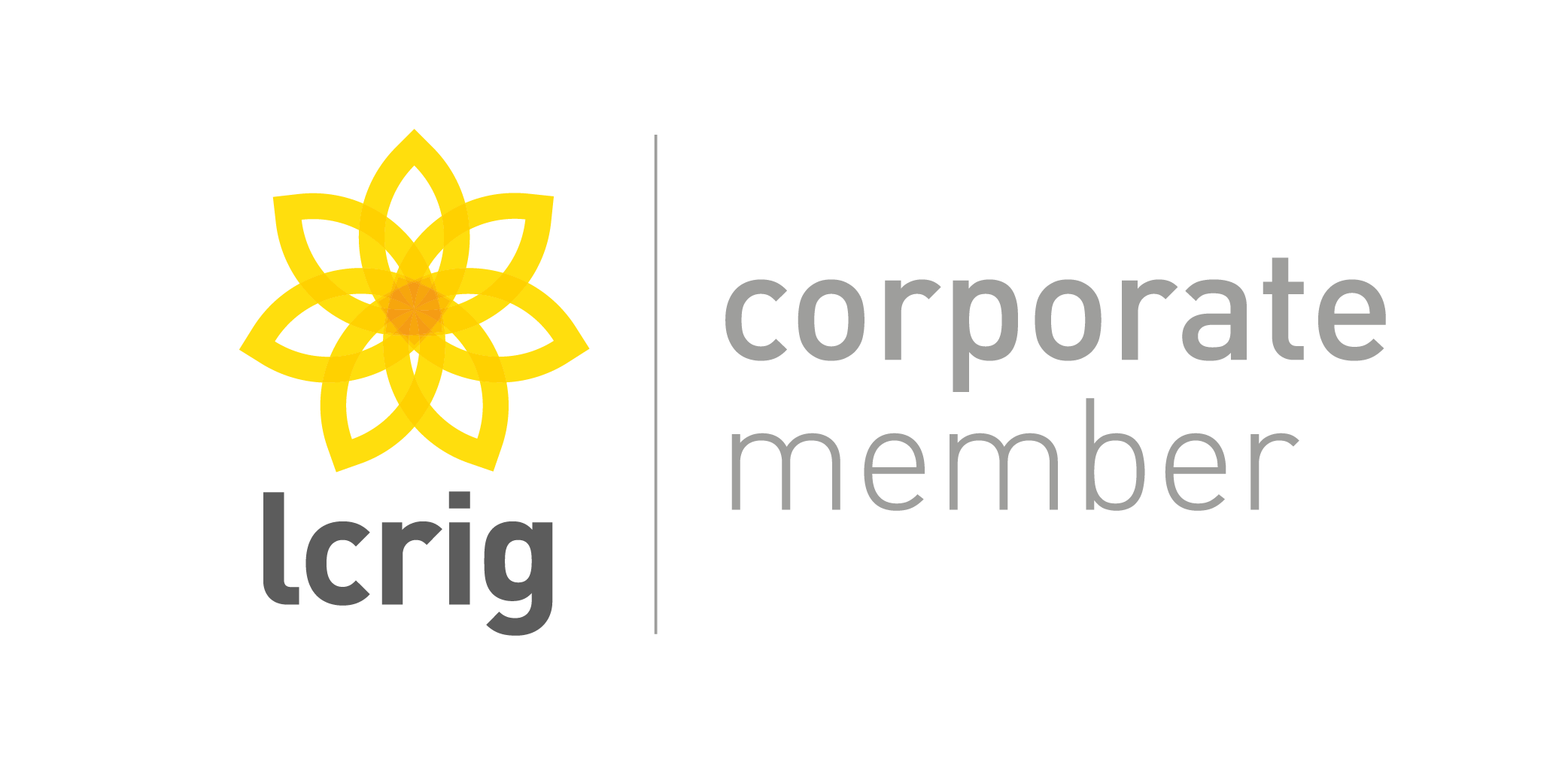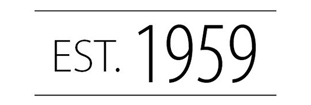Did you know that over 90% of household waste can be recycled?
And yet the recycling rate of household waste in England fell for the first time in 2015 to 43.9%. This means that at least 36% of recyclable waste in England was still being taken to landfill!
Go compare...
- The UK as whole is recycling around 44.3%
- Wales on its own is recycling 63% of waste
- Germany is leading the way with a recycling rate of 66.1% with Austria not far behind at 56%
So together we have quite a lot of work to do.
What does recyclable waste look like?
In this infographic, we explore the facts and the stats behind some of the most common types of recyclable products and materials.

You can also download the infographic for free here.
Batteries
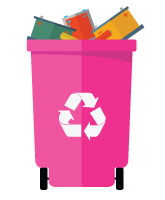
Due to the sporadic nature in which they are used it is difficult to create second nature recycling behaviour.
As a result, 20,000 tonnes of batteries are sent to landfill in the UK every year. An EU Directive on Batteries has recently been published that aims to increase the collection and recycling of spent batteries. You may be surprised to learn that creating a battery uses 50 times more energy that it gives during its life.
- Waste batteries are classified as hazardous waste making recycling the best option
- On average a UK household uses 21 battery’s each year
Aluminium
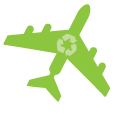
Aluminium is one of the most commonly used metals in the world, every year the UK uses 51,000 tonnes of it. Aluminium is commonly used for packaging for items such as drinks cans and baked bean tins.
- In just 60 days a Coke can could be recycled and ready to use again
- 70% of all aluminium drinks cans are recycled globally
- Brazil & Japan lead the way, recycling about 90% of their aluminium cans
- An aluminium drinks can contains 4 different alloys – the body, can end, ring pull and the rivet in the ring pull!
- Every day the UK sends 80 million food and drinks cans to landfill
- Using the energy saved with recycling just 1 aluminium can you can run a TV for 3 hours
Paper Cups
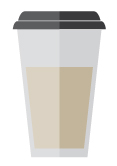
Because of their intended use, paper cups have to be lined with a soft plastic or wax. Paper cups with a polyethylene lining are now also recyclable, the cup simply needs to be separated from the lining to be correctly recycled. Thanks to a combined effort from waste management operators, manufacturers, retailers and specialist recycling plants, this is now happening across the UK.
The outlook for recycling paper cups looks increasingly positive, with a number of specialist companies, such as Frugalpak, now leading the charge of specifically designing cups which are made from recycled cardboard and feature an easy to separate liner. The appetite from UK consumers to be more conscientious with their recycling also looks to be on the rise, with a recent YouGov poll finding 88%* of the nation would use a purpose-built cup recycling bin if they had the option to do so.
Why not take a look at Glasdon UK's specially created eBook to find out how you can dispose of your recyclable coffee cups more efficiently.
Food Waste
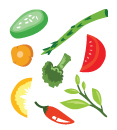
In the UK we throw away around 10 million tonnes of food waste every year, the majority of which was perfectly edible, around 70% comes from our households. However food waste can be recycled into compost (a nutrient rich fertilizer) or biogas which can be used for heating or fuel.
- Composting food waste usually takes 3-9 months
- A compost pile will heat to around 60oC during decomposition
- There are two types of food waste recycling anaerobic digestion & in-vessel composting
Glass
Each family in the United Kingdom uses around 330 glass bottles or jars in a year. The majority of these find their way into landfill rather than being correctly recycled. Once in landfill glass will never decompose, putting a great strain on landfill sites which receive a lot of waste glass.
- Glass is 100% recyclable and can be re-used multiple times
- Glass is produced at a rapid rate, with the biggest furnace creating 1 million bottles per day
- Recycling glass uses only 30% of the energy required to create new glass
Waste Paper & Magazines
Recycling paper is older than you might think, with the de-inking process being invented over 100 years ago.
Paper is one of the most recycled materials and currently two thirds of all waste paper is recycled. However, unlike glass, paper recovery isn’t endless and eventually the fibres become too weak to be reused. In some cases paper can’t even be recycled in the first place due to contamination.
- All newspapers in the UK are made from recycled paper
- In only 7 days your newspaper can be recycled and ready to read again
- Recycling paper creates 73% less air pollution than creating new paper
- The Paper Industry returns over 85% of the water it uses
- UK papermaking has reduced total energy use by 34% per tonne of paper made
- Around 19% of the paper we consume is not recyclable
Plastic
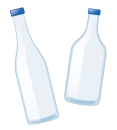
275,000 tonnes of plastic are used each year within the UK, averaging at around 15 million plastic bottles daily.
Due to its composition plastic can take up to 500 years to decompose in landfill. The use of plastic is growing in Western Europe by a rate of about 4% each year.
- Most plastic carrier bags are only used once and take up to 100 years to decompose
- It takes around 5 plastic bottles to create an XL T-shirt
- There are about 1,000 milk jugs and other bottles in a recycled plastic park bench
- The energy saved by recycling a plastic bottle can power a computer for up to 25 minutes
Sources:
http://resource.co/article/what-would-it-take-recycle-80-cent-11899
https://www.theguardian.com/environment/2016/dec/15/recycling-rates-england-drop-first-time
http://gov.wales/statistics-and-research/local-authority-municipal-waste-management/?lang=en
https://resource-recycling.com/recycling/2017/02/07/germanys-recycling-rate-continues-lead-europe/
http://www.letsrecycle.com/news/latest-news/duracell-battery-back-partner-battery-hunt-campaign/
ec.europa.eu/eurostat/web/products-datasets/-/t2020_rt120
thinkcans.net/aluminium/10-aluminium-facts
wrap.org.uk/sites/files/wrap/Estimates_%20in_the_UK_Jan17.pdf
britglass.org.uk
paper.org.uk/mythsandfacts/index.html
wrap.org.uk/category/subject/recycling
YouGov Plc, on behalf of Veolia UK and Ireland (June 2017)

